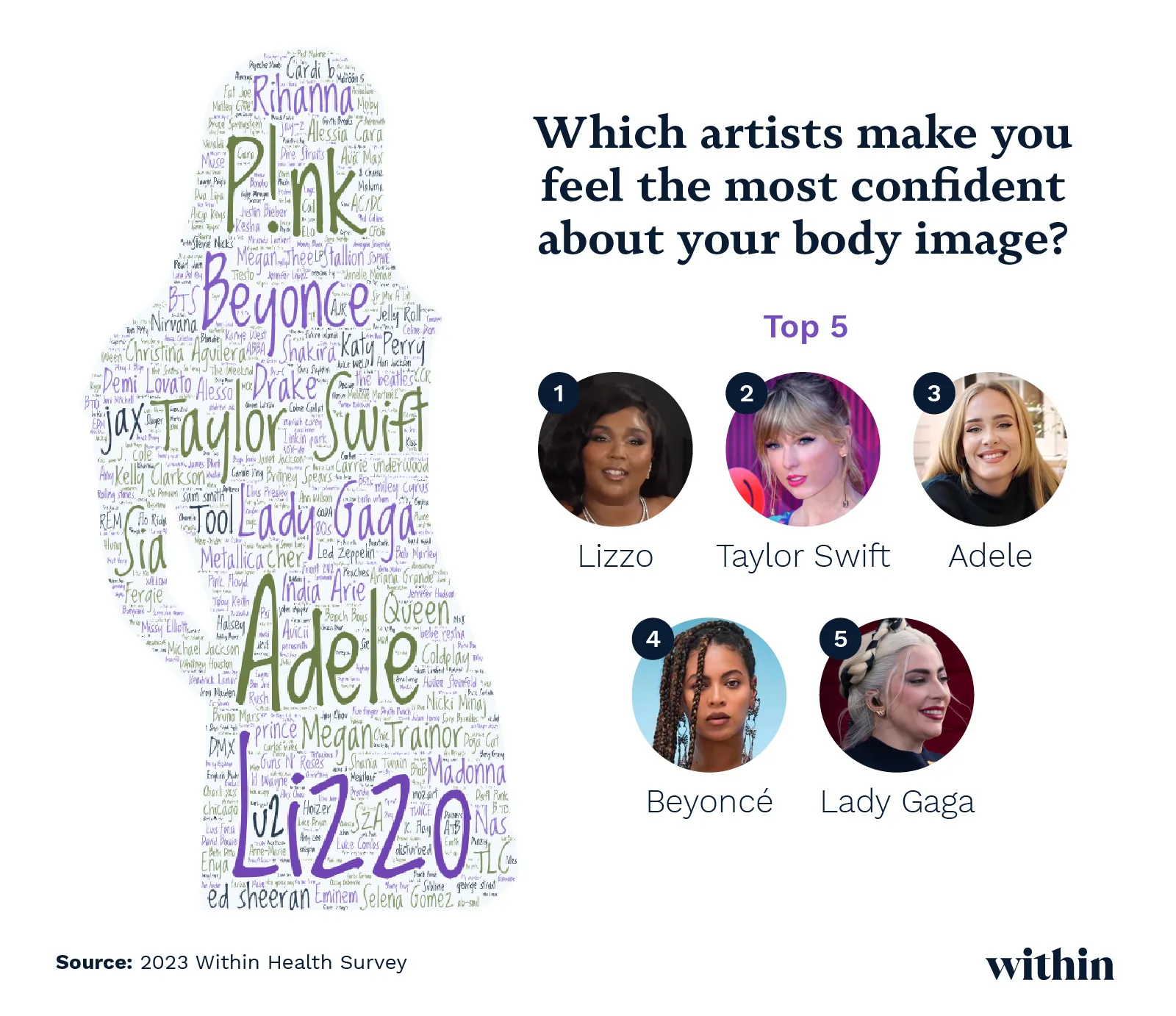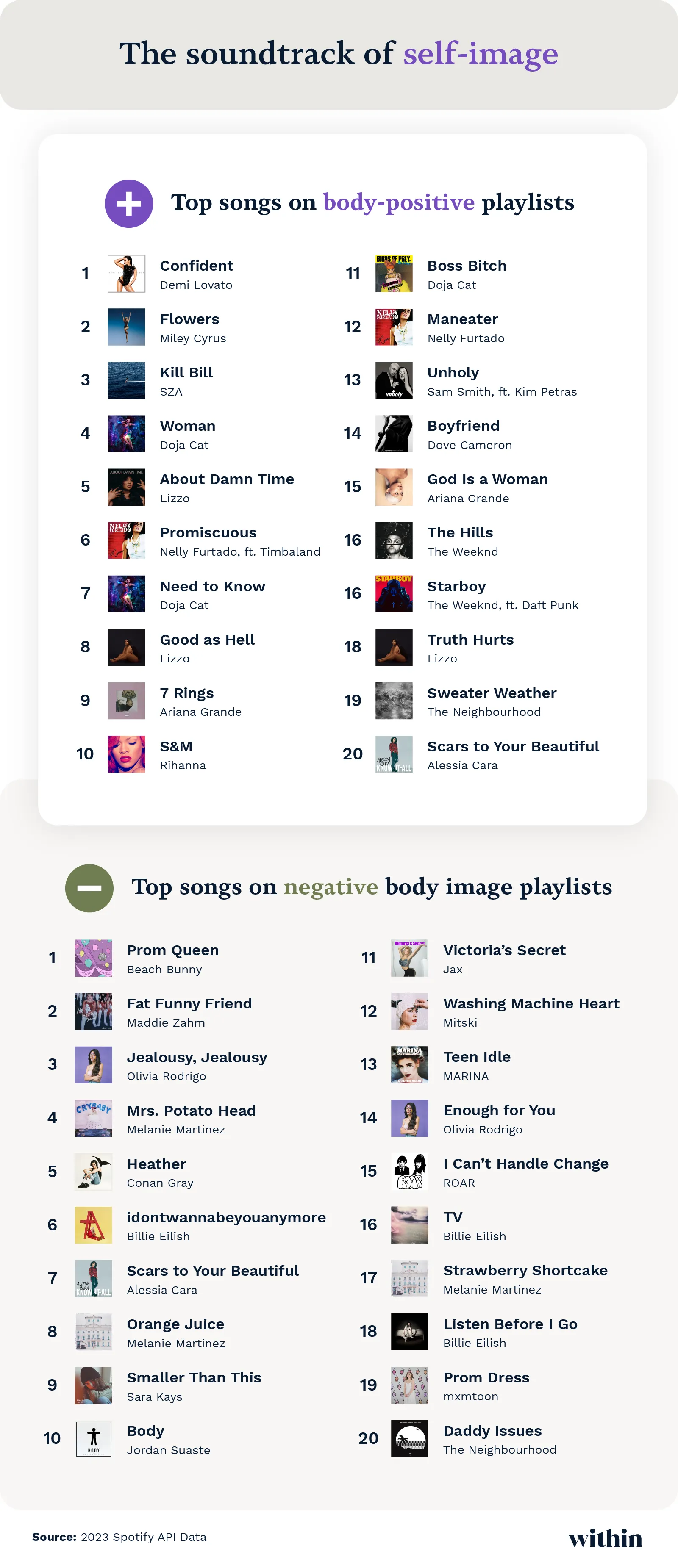
Music has the power to shift a listener’s emotional state from one mood to another.1 But can it impact how they feel about their body? We decided to find out by identifying thousands of body image-related playlists on Spotify. Then, we surveyed over 1,000 listeners about how they feel different music genres, artists, and songs affect their body image.
Fortunately, many celebrities have spoken out in support of the body positivity movement, which celebrates bodies of all shapes, gender expressions, and abilities.2 Let’s find out which artists and genres listeners tune into the most when they want to feel more confident in their skin.

Lizzo’s fans won’t be surprised to learn that she’s the No. 1 artist listeners said they turn to when they need a confidence boost. The Grammy-winning artist is known for encouraging fans to reject body-shaming stereotypes through her music and social media.3 Taylor Swift, Adele, Beyoncé, and Lady Gaga rounded out the top five. Research shows that a person’s confidence and self-empowerment are closely linked to their self-perception and body image, so these artists must write some empowering songs.4

Rock music fans were the most likely to report having a positive body image. The top artists that made them feel confident were Queen, Guns N’ Roses, and Led Zeppelin. Pop and 90s music were the next two most popular genres among listeners with a positive body image. Meanwhile, Metallica, Tool, and Nirvana topped the metal charts for inspiring body confidence in their listeners.
As we combed through Spotify’s many playlists, we found that some songs made their way onto more playlists promoting body positivity, while others were more often featured on those doing the opposite.

The song that generated the most confidence among listeners is literally called “Confident” by Demi Lovato. Her empowering beat must share some qualities with other body-positive favorites such as “Flowers” by Miley Cyrus. These and many other songs in this category feature lyrics about strong individuals who reject outdated beauty standards in favor of creating their own.5
Playlists on the negative end of the body positivity spectrum were more often populated with songs about struggling with beauty standards. Many of these lists included “Prom Queen” by Beach Bunny and “Fat Funny Friend” by Maddie Zahmn. While those tunes aren’t exactly uplifting, some listeners may find comfort in music that relates to their personal struggles.
Many of the body image-themed playlists shared common artists. Let’s find out which musicians appeared most across each type: positive and negative.

When creating playlists that promote body positivity, listeners most often turned to artists like Ariana Grande and Drake. Drake also landed among the top three most popular confidence-boosting rappers and hip-hop artists, while Imagine Dragons was the most common feel-good artist of choice for rock fans. As for the playlists promoting negative body image, Body in the Water and LANY were the ones listeners relied on the most to validate their emotions.
We recently discovered that only 27% of Americans have a positive body image.6 This can have serious consequences, ranging from low self-esteem to more complex health problems.7 But music can be a powerful ally for challenging toxic perceptions that limit “beauty” to certain body types. As popular figures embrace the positive body movement, hopefully they’ll help spread the message that beauty comes in all shapes and sizes.
For this study, we utilized the Spotify API to identify songs and artists in thousands of body image related playlists. We compiled a total of 2,544 playlists that were found when searching: “confidence,” “feel good,” “body positivity,” “body image,” “feeling ugly,” and “bad body image.” The first three searches were grouped as positive body image playlists, and the last three were negative. In total, these playlists contained 165,559 songs. We also surveyed 1,009 respondents to explore how music impacts their body image.
Within Health’s team of caring, experienced professionals are dedicated to providing support and resources for people who have or are recovering from eating disorders. No two recovery experiences are alike, and we work with each client to provide a personalized success plan.
We welcome and encourage you to share any information you learned here for any non-commercial purpose. In exchange, please provide a link back to this original post.






Within is committed to providing accurate and up-to-date information on eating disorders and mental health.
Read our editorial policy.